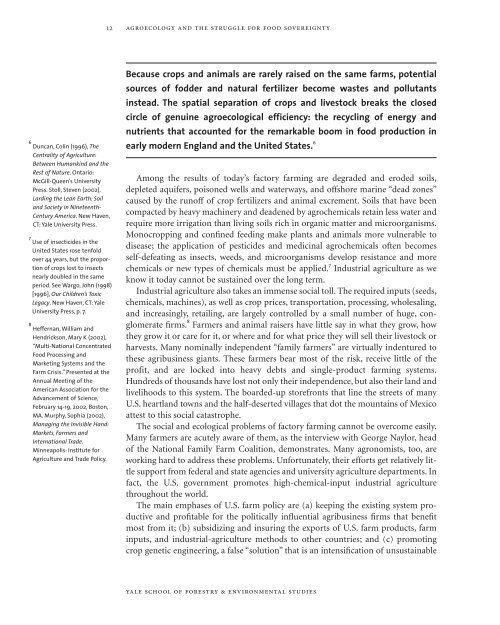Agroecology and the Struggle for Food Sovereignty ... - Yale University
Agroecology and the Struggle for Food Sovereignty ... - Yale University
Agroecology and the Struggle for Food Sovereignty ... - Yale University
You also want an ePaper? Increase the reach of your titles
YUMPU automatically turns print PDFs into web optimized ePapers that Google loves.
12<br />
agroecology <strong>and</strong> <strong>the</strong> struggle <strong>for</strong> food sovereignty<br />
6 Duncan, Colin (1996), The<br />
Centrality of Agriculture:<br />
Between Humankind <strong>and</strong> <strong>the</strong><br />
Rest of Nature. Ontario:<br />
McGill-Queen’s <strong>University</strong><br />
Press. Stoll, Steven (2002),<br />
Larding <strong>the</strong> Lean Earth: Soil<br />
<strong>and</strong> Society in Nineteenth-<br />
Century America. New Haven,<br />
CT: <strong>Yale</strong> <strong>University</strong> Press.<br />
7 Use of insecticides in <strong>the</strong><br />
United States rose tenfold<br />
over 44 years, but <strong>the</strong> proportion<br />
of crops lost to insects<br />
nearly doubled in <strong>the</strong> same<br />
period. See Wargo, John (1998)<br />
[1996], Our Children’s Toxic<br />
Legacy. New Haven, CT: <strong>Yale</strong><br />
<strong>University</strong> Press, p. 7.<br />
8 Heffernan, William <strong>and</strong><br />
Hendrickson, Mary K (2002),<br />
“Multi-National Concentrated<br />
<strong>Food</strong> Processing <strong>and</strong><br />
Marketing Systems <strong>and</strong> <strong>the</strong><br />
Farm Crisis.” Presented at <strong>the</strong><br />
Annual Meeting of <strong>the</strong><br />
American Association <strong>for</strong> <strong>the</strong><br />
Advancement of Science,<br />
February 14-19, 2002, Boston,<br />
MA. Murphy, Sophia (2002),<br />
Managing <strong>the</strong> Invisible H<strong>and</strong>:<br />
Markets, Farmers <strong>and</strong><br />
International Trade.<br />
Minneapolis: Institute <strong>for</strong><br />
Agriculture <strong>and</strong> Trade Policy.<br />
Because crops <strong>and</strong> animals are rarely raised on <strong>the</strong> same farms, potential<br />
sources of fodder <strong>and</strong> natural fertilizer become wastes <strong>and</strong> pollutants<br />
instead. The spatial separation of crops <strong>and</strong> livestock breaks <strong>the</strong> closed<br />
circle of genuine agroecological efficiency: <strong>the</strong> recycling of energy <strong>and</strong><br />
nutrients that accounted <strong>for</strong> <strong>the</strong> remarkable boom in food production in<br />
early modern Engl<strong>and</strong> <strong>and</strong> <strong>the</strong> United States. 6<br />
Among <strong>the</strong> results of today’s factory farming are degraded <strong>and</strong> eroded soils,<br />
depleted aquifers, poisoned wells <strong>and</strong> waterways, <strong>and</strong> offshore marine “dead zones”<br />
caused by <strong>the</strong> runoff of crop fertilizers <strong>and</strong> animal excrement. Soils that have been<br />
compacted by heavy machinery <strong>and</strong> deadened by agrochemicals retain less water <strong>and</strong><br />
require more irrigation than living soils rich in organic matter <strong>and</strong> microorganisms.<br />
Monocropping <strong>and</strong> confined feeding make plants <strong>and</strong> animals more vulnerable to<br />
disease; <strong>the</strong> application of pesticides <strong>and</strong> medicinal agrochemicals often becomes<br />
self-defeating as insects, weeds, <strong>and</strong> microorganisms develop resistance <strong>and</strong> more<br />
chemicals or new types of chemicals must be applied. 7 Industrial agriculture as we<br />
know it today cannot be sustained over <strong>the</strong> long term.<br />
Industrial agriculture also takes an immense social toll. The required inputs (seeds,<br />
chemicals, machines), as well as crop prices, transportation, processing, wholesaling,<br />
<strong>and</strong> increasingly, retailing, are largely controlled by a small number of huge, conglomerate<br />
firms. 8 Farmers <strong>and</strong> animal raisers have little say in what <strong>the</strong>y grow, how<br />
<strong>the</strong>y grow it or care <strong>for</strong> it, or where <strong>and</strong> <strong>for</strong> what price <strong>the</strong>y will sell <strong>the</strong>ir livestock or<br />
harvests. Many nominally independent “family farmers” are virtually indentured to<br />
<strong>the</strong>se agribusiness giants. These farmers bear most of <strong>the</strong> risk, receive little of <strong>the</strong><br />
profit, <strong>and</strong> are locked into heavy debts <strong>and</strong> single-product farming systems.<br />
Hundreds of thous<strong>and</strong>s have lost not only <strong>the</strong>ir independence, but also <strong>the</strong>ir l<strong>and</strong> <strong>and</strong><br />
livelihoods to this system. The boarded-up storefronts that line <strong>the</strong> streets of many<br />
U.S. heartl<strong>and</strong> towns <strong>and</strong> <strong>the</strong> half-deserted villages that dot <strong>the</strong> mountains of Mexico<br />
attest to this social catastrophe.<br />
The social <strong>and</strong> ecological problems of factory farming cannot be overcome easily.<br />
Many farmers are acutely aware of <strong>the</strong>m, as <strong>the</strong> interview with George Naylor, head<br />
of <strong>the</strong> National Family Farm Coalition, demonstrates. Many agronomists, too, are<br />
working hard to address <strong>the</strong>se problems. Un<strong>for</strong>tunately, <strong>the</strong>ir ef<strong>for</strong>ts get relatively little<br />
support from federal <strong>and</strong> state agencies <strong>and</strong> university agriculture departments. In<br />
fact, <strong>the</strong> U.S. government promotes high-chemical-input industrial agriculture<br />
throughout <strong>the</strong> world.<br />
The main emphases of U.S. farm policy are (a) keeping <strong>the</strong> existing system productive<br />
<strong>and</strong> profitable <strong>for</strong> <strong>the</strong> politically influential agribusiness firms that benefit<br />
most from it; (b) subsidizing <strong>and</strong> insuring <strong>the</strong> exports of U.S. farm products, farm<br />
inputs, <strong>and</strong> industrial-agriculture methods to o<strong>the</strong>r countries; <strong>and</strong> (c) promoting<br />
crop genetic engineering, a false “solution” that is an intensification of unsustainable<br />
yale school of <strong>for</strong>estry & environmental studies

















